Mission: ALESIA
“Shall I, that have destroyed my Preservers, return home?” — Alexander the Great
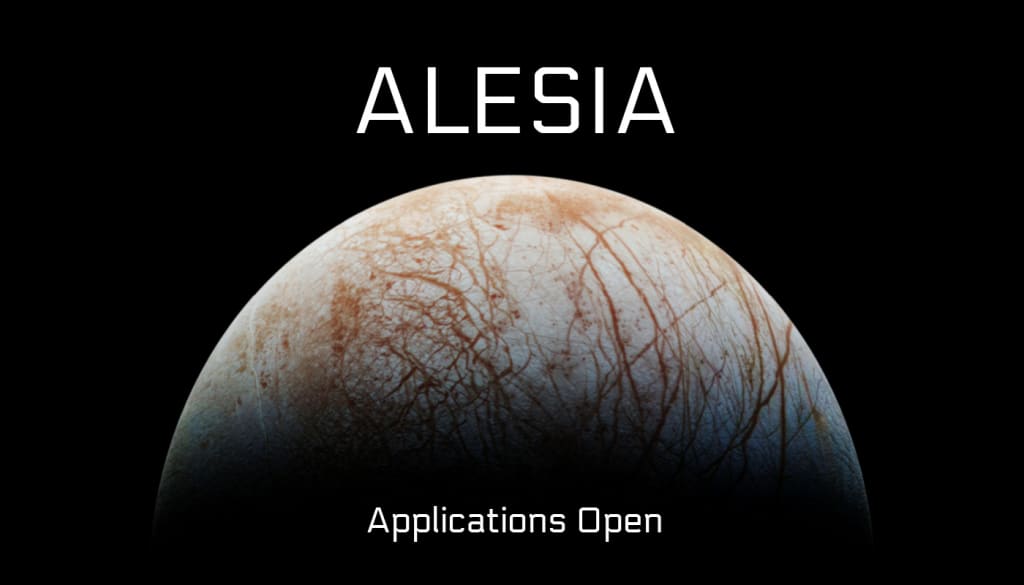
Nobody can hear a scream in the vacuum of space, or so they say — unless you’re a tardigrade. Sarah’s travel mug and its laughable quote were a tribute to her best joke of the semester. You needed humour on your side when teaching Earth Science topics like cleavage and hardness to freshmen, and the young professor had a knack for making her students laugh with her instead of at her. The mug had been a heartwarming surprise in her university mailbox two days after final exams.
But they had not left the rock wedged behind it.
In between the mug and her mail, someone had inserted an unusual piece of rhyolite, a pinkish volcanic rock which typically had a fine, sandy texture. This one was peppered with a variety of pea-sized mineral crystals. The note attached read,
“Shall I, that have destroyed my Preservers, return home?”
The New World Awaits.
There was no signature, and she had no idea what it meant.
It had taken an entire day to slice the rock and grind down the sliver to a hair’s width. The final step was mounting it on a microscope slide and leaving it to dry overnight. Now that the slide was complete, it called to her like a homing beacon from the gloom of the research laboratory.
Sarah had finished her rounds of the farm in record time. She took a swig of her coffee, fit the mug into her drink holder and hopped on her solar-powered motorbike. The morning was clear and cold, a perfect start to summer in Newton Crater, a gravity and atmosphere-controlled outpost in Mars’ southern hemisphere. She kicked the bike into high gear, sending up sky-high clouds of red dust. It was too early for anyone else to be awake, and she sped recklessly down the path. The blue-green algae ponds full of domed rocks called stromatolites whizzed by her in a mesmerising blur alongside the rusty soil.
Twenty minutes later, she skidded to a stop, parked the bike near the back door to her department, and slipped inside. She paced the hallway with her head tilted down, hoping to avoid running into anyone she knew. When Sarah arrived at the lab, she paused to give her great-great-great grandmother Rosemary Blau’s portrait her customary wink. It was a playful gesture to mark yet another day spent honouring her relative’s legacy by doing her duty in the family trade. But, where stromatolite farming was Rosemary’s passion, Sarah’s was volcanology.
Sarah flicked her pink fringe out of her hazel eyes and adjusted the magnification on her microscope. There were more feldspars present than in any other sample she had ever seen; many of them were twinned. It was a unique find — a perfect find, actually. She scratched down some notes and turned her attention to her laptop, where she began adding to her thesis draft.
Along with last year’s tridymite samples from her field expedition to the Tharsis region, this mystery rock was enough to argue that there had been a catastrophic eruption on Mars rivalling that of the eruption on Earth at the Toba Caldera Complex — an eruption so world-changing that the establishment insisted it never happened.
Her assertion that Mars had more silicic volcanism in its history than previously assumed would advance her from assistant professor to tenured associate professor next year. Her insistence that such large-scale volcanic eruptions were possible was a different matter.
Each keystroke was a mini thunderstorm in the making. As exciting as the find was scientifically, publicly confirming anything connected to Toba was dangerous politically. It would reignite the debate around the Bottleneck Hypothesis, a topic which had become an anthem in certain circles on Mars and a foundational argument in the fight for equality in the new colony.
Sarah was a fan of nutshell explanations, and she summarised the version she taught in class within the “further study needed” paragraph of her thesis. In a nutshell, the Bottleneck Hypothesis proposed that humanity had at one point been reduced to a tiny bloodline following a volcanic winter set in motion by the Toba eruption.
A volcanic winter meant that the ash from the eruption had made its way into the stratosphere. While up there, it had acted as a blanket, limiting sunlight for plants and animals. It would have taken a long time for the ash to fall back down, prolonging the dark, cold days below.
The tiny bloodline conclusion was a sharp stone in the boot — pun intended — for those who argued in favour of a class system. Toba was evidence that no one is superior if humanity originated from the same handful of uteruses. For a moment, Sarah debated adding that colloquialism to her paper, then thought better of it. Not a bright idea to poke the hornet’s nest when the escape route was full of vipers.
She chewed her lower lip and stopped typing, belatedly pondering the choice to focus her microscope on the topic at all when it would expose her life to the same inspection. She knew she would be painted as a hypocrite to redirect the conversation. On a planet where mud was a luxury, it didn’t stop the powers that be from flinging it around.
Would she ever be able to escape the shadow of her family’s legacy? she wondered. It never seemed to matter that she had turned down the handouts, working two jobs instead to get through undergrad.
Her phone buzzed, interrupting her train of thought. It was a reminder to attend the annual cultural awareness seminar.
The invitation summarised the speaker’s intended discussion:
“Three hundred years on, the legacy of intergenerational trauma connected to Earth’s evacuation continues to harm. Today’s media is saturated with comparisons between those whose descendants earned their tickets vs those whose family acquired their tickets. The University must counter the divisiveness.”
Sarah rubbed her face with her hands, remembering her graduate supervisor’s advice that sometimes you can do nothing but bear witness and think critically. In went the sentence on uteruses. Serious topics deserved frank descriptions.
Coffee finished, she refilled the mug with water and drank it dry twice — once with coffee residue and once clear. There had been only one subglacial lake on Mars. Using water to rinse and dump was practically a crime. Water was life. She glanced up at the upcoming ALESIA mission poster with its stock image of Europa, a volcanically active, Galilean moon in Jupiter’s orbit whose composition was mainly ocean covered in a crust of ice.
Europa was sure to become the solar system’s Kazakhstan, she thought, a nightmarish race of greed, nationalism, death and destruction to rival the Final War; this time in a fight to secure water instead of uranium. The war had sealed Earth’s fate by bringing an end to global cooperation. She may be hungry for more volcanic data, but there was not enough money in the galaxy to coax her onboard. Sometimes the inverse of curiosity is regret.
She turned back to the microscope and began sketching a diagram of the minerals’ orientations in their matrix, double-checking the uniaxial flashing of the quartz and birefringence of the amphiboles and biotite. Nearly half the sample was composed of inclusions, and she suddenly realised that this was probably the closest sample she would ever find that matched Toba’s supposed mineralogy. Whoever had sent it must have known so, too.
But why send it anonymously?
A knock at her door caused Sarah to jump and smash her eye into the ocular lens. She was always black-eyed in the summer; ADHD would be an academic superpower if it didn’t cause her to forget to eat enough, sleep enough, and take care not to get so immersed in her thoughts that she forgot where she was.
“Professor Hoffman?”
Damn it. No one was supposed to know she was here today. Maybe if she didn’t look up, they would leave.
“Professor? Professor Hoffman!”
No luck.
“Yes,” she responded without turning around.
The intruder marched into her lab and around the desk to assure themselves of her full attention.
Sarah raised her head and folded her hands in her lap. The anxious young man in front of her was too stringy even for string-bean comparisons. By contrast, at 5’11”, Sarah had at least five inches and thirty pounds of lean muscle on him. She offered her former pupil a tight-lipped smile, but he neither noticed nor cared.
“Professor Hoffman, I’m glad I caught you.”
Ben — or was it Tarek? Yes, Tarek. Decent chap. Mediocre grades.
“What can I do for you, Tarek? Been a while since you sat in my Precambrian 402.”
He pushed his glasses up his nose and smoothed his shaggy black mop.
“It’s Juan. I’m a PhD student in the Microbiology department now.”
Juan...wow, not even close.
“Juan! Right, of course. Well, I hope the microbes — I mean professors — over in Bio are doing right by you.”
The scientist stretched her thin smile into one that lifted her cheeks.
“Uh, yeah. Better than Earth Science anyway.”
He rubbed the back of his neck and let out a nervous laugh.
“You’re actually the reason I switched.”
Sarah sighed; biologists never understood her. She cleared her throat.
“Sincere apologies, Juan.”
“It’s OK. I assumed it was sand down a slope when I was assigned the summer job you posted. Tending the stromatolites after hours? You were the admin who signed off on my application. We’ve passed each other a few times, coming and going.”
Sarah winced and softened her tone.
“Let me make it up to you. How about coffee tomorrow, and you can fill me in on whatever it is you’re here for then, alright? Absolutely buried in this sample at the moment. Time-sensitive.”
It wasn’t time-sensitive. Geology of this variety was never time-sensitive. Juan pulled back a little and raised an eyebrow at Sarah. He knew it, too. Perhaps he had deserved a better grade than she had credited him.
Juan frowned and continued.
“Right…well, this can’t wait. Please come with me. It’ll be faster if I show you.”
A twitch of curiosity edged into Sarah’s mind, and she agreed to follow him. Halfway out the door, the quiet echo of approaching voices forced her to remember that there was a 4th-grade summer camp tour starting in an hour. She doubled back, hastily tucking her laptop, slide and sample inside one of the dozens of specimen drawers. Sarah made a mental joke that it was in with the pyrites, a play on her things being hidden from chubby, sticky, pirating hands.
Instead of hopping in an ATV and heading out to the ponds, Juan directed Sarah to the research greenhouse, a short walk from her office. It was where they grew the latest strains of cyanobacteria. Juan didn’t waste time speaking and simply gestured to the empty spot on the tray which housed her family’s prized rock samples from Shark Bay, Australia.
Their disappearance shocked Sarah far more than she let show on her face. She ran through the abductive reasoning. The entire area was guarded with key cards, biometrics and 24/7 surveillance; it wasn’t the vault in the capital, but it was considered secure. No one should have been able to enter the greenhouse, much less remove a specimen.
Unless.
Unless it was removed by someone with ultimate permissions, someone like the University’s largest donor, Crytocorp.
Crytocorp was the company funding the ALESIA mission. Its operations were dubious, and their involvement was one of the reasons she had no intention of joining her colleagues. Sarah remembered that the University had asked her to give the suits a tour last year and how she had reluctantly caved to the pressure.
Only, what would they want with a historical specimen? True, the living rocks were worth millions in the right collector’s market, but according to stock reports, Crytocorp wasn’t hurting for cash. As far as devious intent goes, there were far more valuable strains to pilfer, those capable of altering an entire colony’s infrastructure. These specimens were locked up because of their cultural significance; their value was as an artefact, not a current scientific project or biohazard.
It made no sense.
*
Sarah awoke on a luxurious office chair in front of an empty desk in someone’s plush, contemporary living quarters. Beside her, Juan lay unconscious, sprawled on a couch. Her head was pounding, and there was a whiff of sweetness on her collar.
Ether.
Sarah’s stomach went cold, and the hairs on her neck rose. Then her field survival training kicked in. If you wanted to come home from excursions beyond the outposts alive, you needed presence of mind; show an ounce of fear, and you’ll be eaten alive. Mars had not been empty, and she had the scars to prove it.
She slowed her breathing and calmly rose to leave, but a meaty hand shoved her back down.
“That won’t be necessary, Raj. Leave us, please,” instructed a familiar voice. She swivelled her chair to find the University president putting the electric kettle on in his kitchen and setting up a pair of teacups as though Sarah were there for a social call.
The pair of goons exited the penthouse apartment, and Alfred, an overweight, balding cog in the wheel of bureaucracy, shuffled around the desk. Comparing them, you wouldn’t know Sarah and the president were the same age, but it was the only thing they had in common. Time had not been kind to the former quarterback, and twelve years later, she had no idea why she had dated him in high school. It had been a messy breakup, and they had not remained friends.
Alfred handed her a first-aid kit ice pack, which she activated and draped over her crown. He sat down in his chair facing her, fingers interlocked on top of the imitation-walnut desk. Alfred addressed her in a tone that belittled the gravity of the situation.
“Terribly sorry about the method of transporting you here, Sarah, but we couldn’t risk either of you sounding the alarm.”
Sarah adjusted the ice pack.
“Little extreme, don’t you think? You already reprimanded me for going over my budget. Stealing my family’s mementoes hardly seems a fair way to cover the debt.”
The president waved the comment away.
“Budget? Oh, yes. Off the record, the board doesn’t enforce yours. We didn’t steal the specimens, either.”
Sarah made a mental note to splurge this autumn.
“We?”
“The University. The stromatolites do, in fact, belong to us and not you. Your family endowed them to the University decades before you and I were born.”
“I see. Well then, mystery solved. Fun as it’s been, I’ve got a cat to feed. I’ll be taking my biologist with me and leaving now.”
“You don’t have a cat, Sarah. We have already made inquiries.”
Sarah squinted her face into a sarcastic expression.
“Don’t I? Huh, that’ll be quite an update on the old birth certificate.”
Alfred’s face reddened, exactly the reaction she had intended. Sarah attempted to stand again, but Alfred indicated a button on his chair.
“I think you should stay. But I could call Raj and Mia back if you disagree. I’m not at liberty to let you or —”
He narrowed his eyes at the sleeping undergrad.
“Juan,” Sarah interjected.
The president shrugged.
“You — or Juan — return home. We require the assistance of your expertise.”
Sweat beaded on Sarah’s upper lip.
“And if we decline?”
“Then we shoot you and find other parties. The room is soundproof. I’ve made your excuses, and I’ve left instructions not to interrupt us. Mars has plenty of open desert — and scavengers, as you of all people would know.”
Not since her gravity belt had malfunctioned in the Hellas Impact Basin had Sarah experienced this degree of fear. She ignored the tacked-on dig. Instead, she leaned back into her chair, placed her free arm on an armrest and splayed her knees, taking up as much physical presence as possible.
“Bullshit,” she spat, “If you had anyone else, you wouldn’t be asking me.”
She met the president’s eyes, gritted her teeth and added, “Besides, you’re forgetting that my friends are higher up the ladder than yours are.”
Alfred toyed with a pen.
“Oh, I agree. As a matter of fact, it was their insistence that we involve you. But you’re right; they would disapprove of disposing of you. Juan, however, is dispensable. He doesn’t have friends or family — let alone a cat.”
Alfred dropped the pen, and in smooth succession, he removed a handgun from his expensive suit-jacket and aimed it at the defenceless student’s head. He cocked the trigger. Sarah’s heart jumped into her throat, and her mind raced to calm him without losing her ground. She held her voice steady and gambled.
“Come on, Alfred; dead students don’t pay their tuition. The board won’t be happy to see another loss on their spreadsheet because of you. I hope your couch is stain-proof. It’s not nice to pass on a shabby living space to your replacement.”
It was as though her words had flicked some imaginary switch in his brain, and he whiplashed to an alternate persona. Chuckling with mirth, Alfred disarmed the revolver and put it away. Sarah fought against sighing with relief.
“You’re right. I think he’s better alive. A handy piece of insurance, that one. Your sentimentality has always been your weakness, Sarah. Even in school, you never could dissect the pig fetuses to pass 11th-grade biology.”
Alfred tilted his head and offered a toothy grin, the kind she’d seen him use when rejecting her budget requests.
“Let’s not dispense with pleasantries so soon. I’ve been instructed to extend a personal invitation to you to join the ALESIA team. We are prepared to compensate you in the form of that volcanic data you’ve been salivating over. It takes a few years to arrive, even with the latest advancements in navigation, but we promise you won’t age a day. You’ll be in a state of cryptobiosis, the famed skill of those tardigrades you like to joke about.”
Sarah’s nostrils flared, and she flung the ice pack onto the desk. “And the number one research priority of Crytocorp.”
Alfred picked his pen up again and used it to push the ice pack off his desk and into a waste bin.
“Secondary, actually. Crytocorp’s primary industry is perfecting the art of climate manipulation. It surprises me you were unaware, given your family’s contributions to the project, including its inception.”
He gestured to Juan.
“Did you know the microscopic water bears are the subject of your biologist’s research?”
Sarah said nothing, and he continued.
“Indeed. His pathetic loneliness has inspired him to develop a method of altering the tardigrades' morphology. Specifically, he has been increasing their size, intending to breed interplanetary companion animals. Can you imagine wasting your time on such nonsense? I was set to dismiss him until an alternative use for his ‘pets’ presented itself.”
Juan shifted on the couch, and Alfred sneered at him.
“According to Ja—whatever-his-name-is, the monstrous little buggers are exceptionally resilient, able to survive in a wide range of environmental conditions. They were one of the first emergent Earth lifeforms that transitioned from sea to land. You might even go so far as to name them the harbingers of Earth’s biological evolution.”
“What does that have to do with me? As you said, biology was never my forte.”
Alfred appeared pleased she had asked him. That was a bad sign.
“Though you may prefer silicic geology, Sarah, you are the leading expert in cyanobacteria farming. As I’ve recently learned, cyanobacteria were critical in establishing Earth’s climatic conditions. Conditions which allowed the tardigrades to thrive — paving the way for humans to thrive.”
He paused for dramatic emphasis.
“Great recap. You still haven’t answered my question.”
Alfred’s tone brightened considerably.
“It turns out there is life under Europa’s ice. Sentient life, to be precise. It’s remarkable how they survive in such inhospitable terrain. They flock together in elaborate communities and have no natural predators.”
Sarah’s heart sank. The image was becoming clearer, and she did not like where it was headed. Alfred incorrectly read her unblinking stare as confusion.
“Not to worry, I shall help you connect the dots. Ecology 101: lifeforms exist within a set range of environmental conditions. A niche. We intend to… modify that range on Europa. Furthermore, we intend to level the playing field by introducing competition for survival. Controlled competition, such as genetically modified tardigrades, which would later become a vital source of protein for human colonists.”
He paused to attend to the kettle and allow Sarah to work through the remaining details alone. Blood pounded in her ears as she rushed to decipher his meaning.
Altering Europa’s atmosphere and ecology enough to diminish its population was the stuff of bad sci-fi movies. It wasn’t scalable! Earth’s climate evolution had taken millions of years. Crytocorp may have time on its side, but millions of years?
And yet, rapid change was not impossible. It had taken merely two and a half centuries after the Industrial Revolution for Earth to become uninhabitable, killing billions — while allowing a fortunate few to make a fresh start on Mars, some with money to spare. Two hundred and fifty years was nothing to a company like Crytocorp.
Bile rose into Sarah’s mouth, and she choked it back. When Alfred returned with the tea, she struggled not to show her comprehension and feed his excitement. The president passed her a steaming teacup and saucer, but she ignored it. After an awkward pause, he placed it on a coaster on the desk between them, sat back down and picked up his own. The chair creaked under his enormous weight.
“Mars has served its purpose, and the expense of maintaining its population is immense, a population which has rapidly expanded over the last several decades. Many children being born naturally are not at all superior enough to justify their resource consumption. DNA splicing and lab-manufactured births have made large populations redundant. Ahead of our expansions elsewhere, it is time the elite moved on to a more permanent seat of power.”
He smiled broadly and glanced at his paperweight, a tacky, miniature bust of Caesar’s head.
“A governing seat worthy of Rome, if you will.”
Sarah recoiled as if he’d slapped her in the face.
“I have to hand it to you, Alfred. That’s the foulest hot air you’ve passed in a long time.”
Alfred frowned.
“No, it’s survival of the fittest. The opposite side of that Toba nonsense you and those leftist twits continue to pander behind closed doors — as if we don’t know. The elite are not unfeeling; if there are Europans who survive and are amicable to surrender, we shall be merciful masters. The new colony will need a labour force. With your assistance, there is a higher likelihood of successful climate blending and fewer casualties.”
Sarah trembled with anger, clenched her fists and raised her chin.
“You’ve lost your mind if you think I will ever — ever — agree to help Crytocorp commit genocide!”
Alfred let out a throaty laugh and took another slow sip of tea to conceal his cowardice, his free hand hovering over the safety button. His blood pressure was getting the best of him, and grotesque purple splotches mottled his greasy skin.
Juan raised his head and looked around but said nothing, like a frozen rabbit.
“Such a temper. Yes, Sarah, I believe you will help us. Shooting you was a bluff; what follows is not. You have two options:
“If you refuse to help us, we pull the plug on the farm and let nature take its course on Mars, bringing only those worthy of the investment along with us to the space station. We estimate that nearly 97% of the population here will perish. Your refusal will not deter our plans, but it will cause delays, thereby further limiting the number of people we are prepared to accommodate during the interim.”
Sarah rose and gripped the desk. Alfred followed suit.
“Or?” she shouted.
“Or, you follow Crytocorp’s orders and expedite the hostile takeover, and we agree to use a portion of the budget to maintain the Martian colony. But it will be within more acceptable birth allowances. Terms would include sterilisation of individuals deemed unfit to reproduce or sterilisation after two healthy children. In the instance of an inferior addition, those children would be culled immediately. Nothing personal. Business is business!”
Alfred was out of breath. He appeared smug after finishing his speech, confident that Sarah would choose her fellow humans over extraterrestrials.
Sarah clenched her jaw and lowered her voice.
“I never imagined you would sink below the disgusting actions of your father. I thought I knew you — disliked you — but knew you. Don’t you see that what Crytocorp is proposing is beyond evil? It’s a melting pot of the worst crimes humans are capable of in a singular, thorough plan of action! How can you go along with this?”
Alfred mopped sweat from his brow with his satin pocket square.
“Austerity is what kept humans from going extinct. Advancement includes casualties. It’s a necessary evil. Your grandmother knew it; if you hadn’t insisted on doing everything the hard way, this wouldn’t even be a conversation. Securing Europa means living in a home where you don’t have to account for every drop of water that goes in and out. It means a true restart. No more clinging to a rusted rock to survive! This is the New World we have been waiting for. Can’t you see that’s worth fighting for? God, you really haven’t changed, have you?”
She took a ragged breath.
“No, I haven’t. That was your mistake.”
Sarah chucked her tea into Alfred’s face, causing him to scream in agony. She used the distraction to upend the desk, knocking him off his feet and sending him scrambling for his safety button. Before he found it, Sarah kicked him hard in the stomach. The gun fell from his pocket and she flicked it out of his reach with her foot. While he was gasping for air and clutching his abdomen, she grabbed the paperweight from where it had tumbled off the desk and clouted him over the head. The cheap fake smashed to pieces, and Alfred passed out. Sarah picked up the gun.
Standing above her ex-lover’s pitiful form, her breathing shallow and body shaking from adrenaline, Sarah debated shooting him. It took her a long moment to realise that killing Alfred wouldn’t stop those above him; it would only change what she cherished about herself. She set the safety and tucked the gun into her waistband.
“What happens now?” Juan mumbled.
Sarah had forgotten about the biologist and wheeled around to find him still seated on the couch. He seemed a little shaky but otherwise alright. She paused to consider the options.
Finally, she replied,
“Let’s give him a night to forget.”
“Sorry, what?”
Juan watched in disbelief as Sarah unbuttoned Alfred’s shirt and stripped him of his pants, shoes, and jacket.
“Throw these in the bedroom and check his nightstand for a bottle of bourbon. It’ll be there.”
“OK.”
Juan left for the bedroom. In the meantime, Sarah erased the signs of a struggle. She righted the desk and chair and picked up the fragments of the paperweight and teacups, which she tossed into the garbage. Then she grabbed a towel from the kitchen to sop up the tea.
“Found it,” called Juan.
“Perfect.”
Sarah doused Alfred’s shirt and left the bottle open beside him on the floor.
It could be hours before the president was found, giving them a solid head start as well as an alternative version of events. Alfred’s tendency to overindulge was no secret, and he would never admit Sarah had bested him. She opened the door to the emergency stairwell and motioned for Juan to follow her lead.
Juan pushed his glasses up his nose.
“Where are we going?”
A weary Sarah summoned her humour and raised her eyebrows.
“Ever met a physicist in their natural habitat?”
Panic returned to Juan’s eyes, and he shook his head.
“Brace yourself, kid. They make geologists seem tame.”
-- end of contest entry---
The author’s concept for this pseudoscience prologue is derived from her real-life science research project, "Breathing New Life Into Mars", at Western University, Ontario, Canada.
In case you are now in need of a laugh, attached is a rendering of Sarah’s mug.
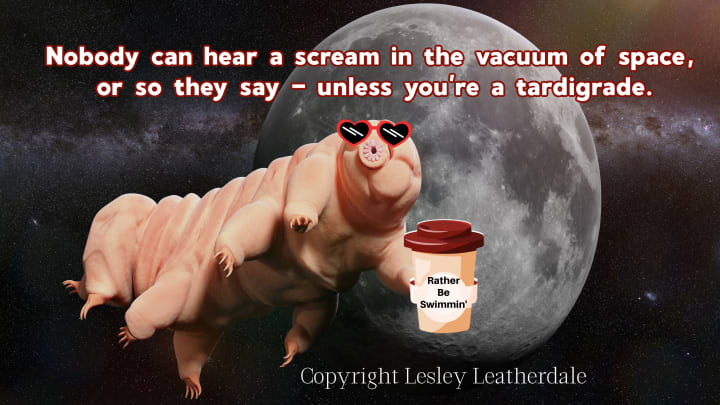
*
With gracious thanks to the members of Great Incantations, most especially Dane B.H., Madoka Mori, Caroline Jane & Jordan Twiss.
And the ultimate proofreader, mum.
More information on stromatolites.
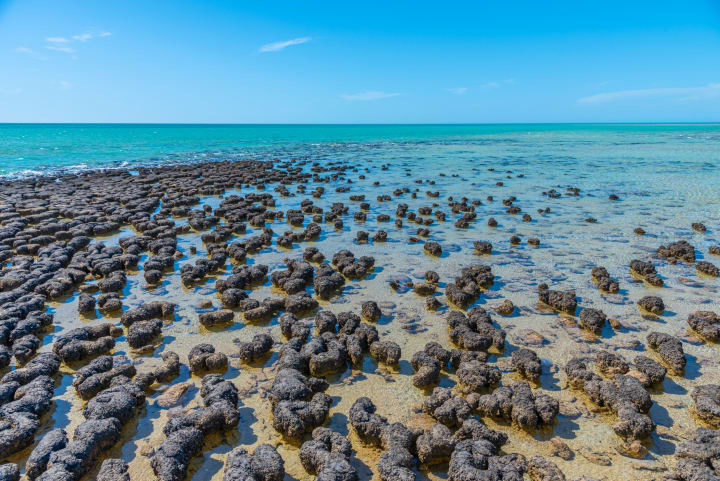
This story is entered into the New Worlds Challenge on Vocal Media.
Images licensed from Shutterstock.
August 2022
About the Creator
Call Me Les
Aspiring etymologist and hopeless addict of children's fiction.
If I can't liberally overuse adverbs and alliteration, I'm out!
Instagram @writelesplaymore
~&~
Enjoyed the story? Support the Creator.
Subscribe for free to receive all their stories in your feed. You could also pledge your support or give them a one-off tip, letting them know you appreciate their work.
Reader insights
Outstanding
Excellent work. Looking forward to reading more!
Top insights
Compelling and original writing
Creative use of language & vocab
Easy to read and follow
Well-structured & engaging content
Excellent storytelling
Original narrative & well developed characters
On-point and relevant
Writing reflected the title & theme
Expert insights and opinions
Arguments were carefully researched and presented
Masterful proofreading
Zero grammar & spelling mistakes

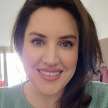

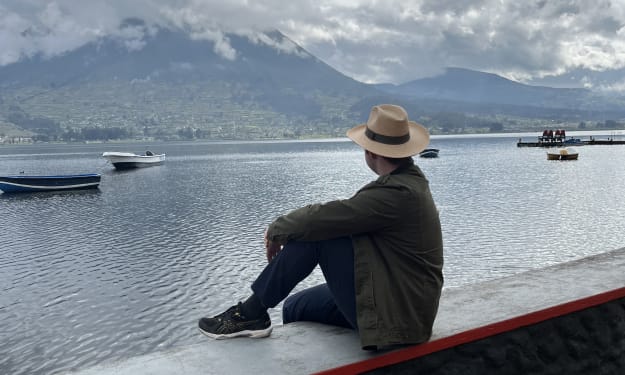

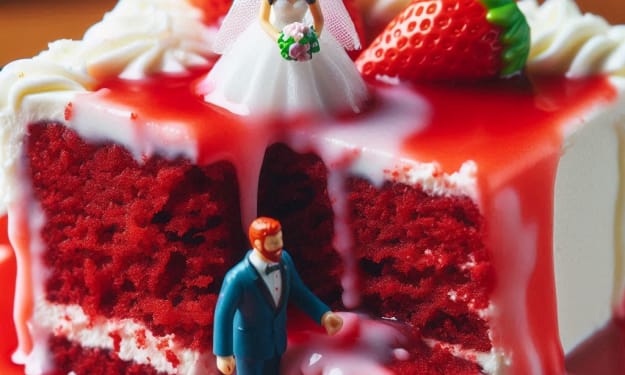
Comments (16)
Call Me Les-polished words, clarity, and intelligence of expression.
That was a great read, Les! Super interesting plot, and that birth certificate line had me cackling! 😂
I love it!!
This comment has been deleted
WOW! Impressive work and no small amount of research and knowledge went into this. Bravo! More coming I hope!
I can tell you really enjoyed writing this, and that Sarah was one of those MCs that just breathes herself to life - I'm enamored with her characterization and would love to read more of her!
Nice job. Your descriptions and the characters really drew me in.
Well done, this was a very fun thrill of a read.
Ooh...this is so good! I love how the plot entangles science and political science, and...volcanologists for the win! :)
This should be a movie, Les!
You did a great job reworking the first bit. It really pulls the reader in and makes them feel present in the moment. The attention to detail with all the science is still as impressive as ever! Great work!
Very epic story!!!
Loving it! Fabulous as always!👏💖😊💕
Great job. I loved it. Looks like a contender.
The characterisation is beautifully endearing. You want them to win at life and the science is excavatingly new (see what i did there 🤦♀️) Great work. 👍👍👍
I re-read this version and it is so nicely polished now! My favourite line is "On a planet where mud was a luxury, it didn’t stop the powers that be from flinging it around."
This is so very well done. The characters came to life for me. It really feels like the beginning of a much larger story. Excellent work.